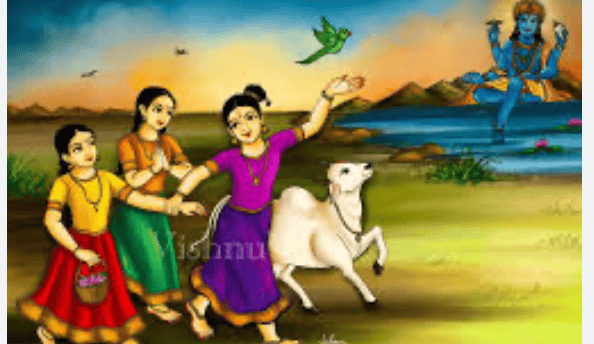Vedanta
Tiruppavai Pasuram 17: A Glimpse into Devotional Yearning and Divine LoveYour blog post
Tiruppavai, composed by the revered Tamil saint-poet Andal, is a collection of 30 pasurams (hymns) that express intense devotion to Lord Vishnu, particularly in his form as Lord Krishna. These hymns are part of the Naalayira Divya Prabandham, a collection of devotional poetry by various Alwars (saint-poets), and they form a vital part of Tamil Vaishnavite tradition. The pasurams are recited particularly during the Tamil month of Margazhi (December-January), and they hold immense spiritual significance. post description.
Madhavi
1/6/20253 min read


Pasuram 17 is a beautiful expression of longing and love for the divine, drawing on rich metaphors and emotional depth. It highlights the soul’s yearning for reunion with God, transcending worldly desires and seeking the ultimate bliss of divine proximity.
Meaning and Interpretation of Pasuram 17
The 17th Pasuram of Tiruppavai expresses Andal's heartfelt longing and deep emotional connection with Lord Vishnu. The pasuram begins with the imagery of the soul leaving its earthly confines and ascending to a place of supreme bliss, where it experiences divine love and grace.
First Line: "அகற்வொன் ஆகிப் பொய்ந்தெடுத்து"
Andal begins by expressing how the soul, once it has detached itself from worldly distractions, moves towards a higher spiritual state. The phrase "அகற்வொன் ஆகிப்" (literally, "leaving the worldly realm") refers to the soul’s detachment from the material world. This detachment is not just physical but also emotional, as the devotee (here, Andal herself) seeks to transcend the mundane in favor of spiritual bliss.
Second Line: "அரிதழ் பழுத்தே அன்பை தரும்"
In this line, Andal compares the fruit of good deeds to a ripe fruit, ready to yield its sweetness. The “ripening fruit” is a symbol of the devotee's heart, which, through constant prayer, devotion, and surrender to the Lord, becomes mature and ready to receive the divine grace. The term "அன்பை தரும்" (gives love) emphasizes that the realization of divine love is the highest form of spiritual fulfillment.
Third Line: "பரிந்தலைப் பொலிவுள்ள சாய"
Here, Andal invokes the image of radiant beauty. "பொலிவுள்ள" (radiant or glowing) and "சாய" (shade or form) are metaphors for the overwhelming beauty of the divine presence. The Lord, in all His splendor, is portrayed as both a source of immense joy and comfort—a divine form whose beauty and grace fill the heart of the devotee with peace and bliss.
Fourth Line: "உலகவின் ஓர் அமுதம் நெஞ்சே"
The soul is depicted as yearning for the "amudham" (nectar) of divine presence. "உலகவின் ஓர் அமுதம்" refers to the nectar that is found only in the union with the divine, symbolizing the highest form of spiritual satisfaction. Andal's heart yearns for this divine nectar, which can only be obtained by surrendering to Lord Vishnu.
Fifth Line: "எண்ணல் பறங்கொண்டேன் கண்ணும் நெஞ்சம்"
In this line, Andal speaks of the union of her thoughts, her eyes, and her heart, all of which have turned toward the Lord. "எண்ணல் பறங்கொண்டேன்" indicates that her mind has become completely absorbed in thoughts of Lord Krishna. Her eyes and heart, too, are fixated on Him, signifying the total devotion and surrender that Andal feels.
Sixth Line: "அன்னிய உருகும்ம் உள்ளம் பரிதவிக்கும்"
Here, the poet speaks of the emotional intensity of love for God. "அன்னிய" means 'stranger' or 'someone different,' while "உருகும்ம்" refers to melting or softening. Andal's heart melts in the face of her deep, unrelenting love for the Lord. This line indicates the soul’s vulnerability and the intense yearning that comes with being in love with the divine.
Seventh Line: "நெஞ்சில் விடுதலையின் நிலா"
In this poignant line, Andal likens her heart to the moon, which represents serenity, purity, and peace. "விடுதலையின் நிலா" refers to the liberation of the soul. Just as the moon provides calm and light in the dark sky, the love for Lord Vishnu brings peace to the devotee’s heart. The "liberation" (விடுதலையின்) mentioned here is the ultimate goal of spiritual practice—the freedom from material suffering and the reunion with the divine.
Eighth Line: "சொல்லும் தழல் பேர்வைப் பொழுதே."
Finally, Andal concludes the pasuram by acknowledging that only through divine grace can the soul be completely freed. The phrase "சொல்லும் தழல்" refers to the spoken word, and "பேர்வைப் பொழுதே" indicates the moment when all spiritual efforts culminate in divine communion. The soul’s ultimate liberation comes only when it is fully immersed in devotion, surrendering completely to the divine will.
The Spiritual Message of Pasuram 17
Pasuram 17 embodies a deep sense of longing, not for material possessions or worldly pleasures, but for union with the divine. The imagery of the soul yearning for the "nectar of God" and the heart "melting in love" conveys the intensity of devotion that Andal exemplifies. The pasuram highlights the emotional purity and spiritual focus that a devotee must cultivate on their path to liberation.
In a broader sense, this pasuram is a reflection on the nature of divine love. It speaks to the soul’s journey from attachment to detachment, from the ordinary to the extraordinary, and from ignorance to enlightenment. The language of longing used in the poem, especially the metaphor of the moon, represents the purity and tranquility that comes with divine grace and union.
Conclusion
Tiruppavai Pasuram 17 stands as a timeless expression of spiritual longing, devotion, and surrender. Through its poignant imagery and powerful metaphors, it captures the essence of the soul’s journey toward divine realization. Andal's work continues to inspire millions of devotees, serving as a guide to cultivating deep, unshakeable devotion to God, surrendering the ego, and seeking the bliss of divine union. The devotional intensity and purity of Andal’s words in this pasuram resonate deeply with anyone who has ever yearned for a connection to the divine, making it one of the most cherished hymns in the Tamil Vaishnavite tradition.
By reciting this pasuram, devotees seek to purify their hearts, remove worldly attachments, and open themselves to the grace of Lord Vishnu, aspiring to reach the ultimate state of spiritual fulfillment—reunion with the divine.
